- Home
- Joy Fielding
The Final Act Page 5
The Final Act Read online
Page 5
“The same as I,” her mother corrects. “Besides, imitation is the sincerest form of flattery.”
“I hate her.”
“I hate her too,” Leigh echoes.
“You’ll love each other when you grow up,” their mother promises.)
Did they? Cindy wondered now, watching as Mr. Clean explained his various tattoos to his curious companion. She and Leigh were so different. They had different interests, different styles, different tastes. In clothes, in politics, in men. Try as they might, and occasionally they really did try, they never quite seemed to connect. Their empathy was forced, their sympathy strained. They tolerated each other. Sometimes just barely.
Strangely enough, their relationship had been at its best just after Cindy got married and again just after she got divorced. When Cindy eloped with Tom to Niagara Falls without a word to anyone, it had been Leigh who’d convinced their parents to get over their anger and accept the young man Cindy had chosen. Leigh had been a regular guest at their tiny apartment, a co-conspirator after the fact.
After Tom walked out, taking Julia with him, Leigh had been equally supportive, dropping over dinners, going grocery shopping for her distraught sister, offering to baby-sit Heather. For months, she’d called first thing every morning and again before she went to bed. She’d made sure Cindy had the best divorce lawyer in the city. She’d literally clapped her hands when Cindy’s settlement guaranteed her security for life.
Leigh’s own marriage, to a high school principal, had always seemed happy enough. Warren was a kind man, patient to a fault, and he seemed to genuinely love his wife. “Warren would never cheat on me,” Leigh had said on more than one occasion, and Cindy had nodded her agreement, confident in the rightness of her sister’s assessment, pretending not to hear the silent addendum, “the way Tom cheated on you.”
“Mom?” Heather was asking now. “What’s the matter? Why are you smiling like that?”
Cindy unclenched her teeth. “Just this stupid TV show.” She flicked off the remote control, watching Mr. Clean and his companion disappear into darkness.
“Hey. . .”
“Call your father for me. Please,” Cindy added when her daughter failed to respond.
Heather slumped toward the phone. “I don’t understand why you can’t call him.”
“I don’t want to speak to the Cookie,” Cindy muttered.
“What?”
“Just call him.”
Heather punched in the numbers, shifting her weight from one foot to the other as she waited for someone to answer the phone. “Hey, Fiona,” she said while Cindy scrunched up her nose, as if she’d just smelled something unpleasant. “It’s Heather. I’m fine. How are you?”
Cindy walked back into the bathroom, stuck out her tongue at her reflection. I’m just fine,” she said in the Cookie’s chirpy little voice. “Right as rain. Happy as a lark. Peachy perfect.”
“Is my sister there?”
Cindy grabbed a brush, dragged it through her hair, listened for the answer.
“Is she expected there for dinner?”
So, Julia wasn’t there. At least not yet. “Ask her if she’s heard from her,” Cindy instructed her daughter, returning to the bedroom, the brush dangling from her hair.
“Have you heard from her?” Heather asked dutifully, then shook her head in her mother’s direction, “Okay, well, if you do,” Heather continued over her mother’s continued prompting, “have her call home. Okay? Yeah, everything’s fine. I just want to speak to her. Okay, yeah. Bye.” She hung up the phone.
“Julia’s not there?”
Heather shrugged her indifference. “She’s fine, Mom,”
“It would be nice if she phoned, that’s all.”
“How come you call Fiona a cookie?”
Cindy shrugged, pulling roughly at the brush in her hair, feeling the handle break off in her hand. “Oh, that’s just great.”
“I’ll do it.” Slowly, gently, Heather extricated the head of the brush from her mother’s hair. Then she slid it back into the handle and began tenderly manipulating Cindy’s soft curls. “You’ll see. I’m going to make you absolutely gorgeous for your date tonight.”
“It’s not a date.”
“I know it’s not.”
“I probably shouldn’t even be going.”
“Don’t be silly. I’ll be fine here by myself.”
“It’s Julia I’m worried about.”
Heather stopped her gentle ministrations.
“That’s it? You’re done?”
Heather nodded, returning the brush to her mother’s hands. “You don’t need me,” she said.
FIVE
“So, how do you know Trish?”
Cindy tucked her hair behind her right ear, less from necessity and more because it gave her something to do with her hands. She straightened the cutlery on the white tablecloth, although it was already perfectly straight, and refolded the burgundy-colored napkin in her lap. Then she tucked the hair behind her right ear a second time and stared out the long window behind Neil Macfarlane’s head, watching the blue slowly leak from the sky, bathing the expansive panorama in muted gray. Soon it would be dark, she thought, mindful that the days were getting shorter. Hold that thought, she told herself. Save it for when the conversation runs dry, for when the small talk gets so tiny it threatens to disappear altogether. Isn’t that why she stopped dating in the first place, why she vowed never to subject herself to the single scene’s unpleasant vagaries again? Or was it because the men had simply stopped calling? “We met about ten years ago. At one of the makeup counters in Holt’s. We actually walked right into one another, reaching for the same bottle of moisturizing cream,” Cindy continued, unable to stop the unexpected torrent of words. “We were both in a hurry. It was during the film festival, and we didn’t have much time between films.”
The man across the table nodded. “I understand Trish is quite the movie fan.”
“Yes. We both are.” Of course, the most logical follow-up would be for her to ask, “And you? Do you like movies too?” But she didn’t because such a question would imply she was interested in whether Neil Macfarlane liked movies or not. And she was determined not to be interested in anything about Neil Macfarlane at all. So instead, Cindy scratched at the back of her neck and reached for the bread basket, although she merely shifted it a little to the left before returning her hands to her lap. She didn’t want to fill up on bread. She didn’t want to get bread crumbs all over her white blouse and gray linen pants. She didn’t want the waiter approaching with one of those frightening little gadgets they employed to clean the tables of assorted debris, each roll offering a silent rebuke for being such a sloppy eater. All she wanted was to finish her dinner, assuming the waiter ever came by to take their order, drink her wine, assuming the wine steward could locate the expensive Bordeaux Neil had ordered, and get the hell out of the restaurant and home to Julia, assuming her older daughter had finally decided to put in an appearance. Where was she anyway? At the very least, why hadn’t she called? Cindy rifled through her purse and checked that her cell phone was on.
“Everything all right?” Neil asked.
“Fine.” Cindy smiled, careful to avoid the intense scrutiny of his eyes, eyes she’d noticed immediately that were an amazing shade of blue. Somewhere between teal and turquoise. With a sparkle, no less, as if it had been dabbed on with silver paint. Trish hadn’t been exaggerating. Neil Macfarlane was cute all right. More than cute. He was drop-dead gorgeous. Cindy had decided immediately that the less she looked at him the better off she’d be.
(First impressions: A man, tall and slender, wavy brown hair atop a boyish face, waits for her at the bottom of the elegant, open, red mahogany staircase, the city stretched out tantalizingly behind him in the long expanse of glass; he smiles, deep dimples creasing his cheeks as she warily approaches and the city blurs behind him; he is wearing a blue shirt that underlines the fierce blue of his eyes; his hands are wa
rm as they reach for hers; his voice is soft as he speaks her name. “Cindy,” he says with the quiet confidence of someone who is used to being right. “Neil?” she asks in return, feeling instantly foolish. Who else would he be? Already she feels inadequate.)
“So what kinds of movies do you like?” Neil was asking as the wine steward approached the table, proudly displaying the requested bottle for Neil’s perusal. “Looks fine,” Neil told him, although his eyes never strayed from Cindy.
Cindy, in turn, focused all her attention on the wine steward, watching as he slowly and expertly began the process of removing the cork from the bottle. “I like all movies,” she said vaguely, disappointed when the cork put up no real resistance, sliding out of the bottle with ease.
The steward offered the cork to Neil, who dutifully sniffed at it and nodded his approval, then tasted the sampling the steward poured into his glass. “Fine,” he said. “Excellent. It just needs a few minutes to breathe,” Neil advised her.
I know how it feels, Cindy thought, but didn’t say, watching as the steward filled her glass just short of halfway.
“So, you have no preferences at all?” Neil was asking.
What was the matter with him? Cindy wondered impatiently. Why did he insist on making conversation? He didn’t really give a damn what kinds of movies she liked, or how she and Trish had met, or anything about her, for that matter. And if he did, it was only because he wanted to sleep with her, and he knew his chances would be greatly improved if he at least feigned an interest in her. Although why he would want to sleep with her was a total mystery. Look at him, for heaven’s sake, Cindy thought, deliberately looking at the floor. On any given night, he undoubtedly had his choice of any number of much more attractive, much fitter, much younger women. Why would he want to sleep with her? That was easy, she decided. He wanted to sleep with her because she was here. It was as simple as that. It didn’t mean anything.
It doesn’t mean anything.
How many times had Tom told her exactly that?
Cindy raised her head, stared directly into Neil Macfarlane’s brilliant blue eyes. “I like sex and violence,” she stated honestly, the first time she’d admitted that to anyone.
“What?”
“You asked what kind of movies I like. I like sex and violence,” she repeated, reaching for her wineglass, taking a long sip, feeling the wine slightly abrasive as it scratched against her throat. He was right. It needed a few more minutes to breathe. Cindy tossed her hair back, took another sip. “You look shocked.”
Neil smiled, the dimples framing his mouth like quotation marks. “I understand liking sex. But blood and guts?”
“Not blood and guts so much,” Cindy countered, feeling the wine curl into her stomach, like a contented cat in a wicker basket. “I don’t like watching people get blown up ad nauseum. I guess what I like is more the threat of violence, the possibility that something terrible is about to happen.”
“Women-in-jeopardy,” Neil said matter-of-factly, nodding as if he understood, as if he already understood everything there was to know about her, as if there was nothing more to discover.
“I hate that term,” Cindy said, stronger than she’d intended. “Women-in-jeopardy,” she repeated, taking another sip of wine, emboldened. “It’s condescending. You never hear people say men-in-jeopardy. And, I mean, isn’t that what drama is all about? People in jeopardy? Why is it somehow less valid when it concerns women? I’m really sick of that attitude.” Whoa, she thought. Where had that come from?
Neil leaned back, lifted his hands in the air in a gesture of surrender. Cindy braced herself for his comeback, some smart remark that would put her in her place, reduce her to the role of angry, man-hating feminist. Instead he said, “You’re right.”
I’m right? she thought, relief washing over her, like an unexpected shower. She tapped her heart with her open palm. “I don’t think anybody’s ever said that to me before.”
He laughed. “I guess I’ve just never really thought about it, but now that I do, I see your point—all drama is about people in peril, at a time in their lives when they’re at risk, when they have to take a chance, make key decisions, get out of sticky situations, save themselves. The term ‘women-in-jeopardy’ is condescending. You’re absolutely right.”
Cindy smiled. He must really want to sleep with me, she thought. “Did Trish tell you I haven’t had sex in three years?” The words were out of her mouth before she could stop them.
Neil’s hand froze as he reached for his glass. “I don’t think she mentioned that, no.” Slowly, carefully, he brought the glass to his lips, then took a long sip of wine, holding it in his mouth, almost as if he were afraid to swallow.
“You think it’s breathed long enough?” Cindy asked, enjoying his discomfort.
He gulped it down, exhaled deeply. “Definitely breathed long enough.” The waiter approached, and asked if they’d reached a decision about their order. Neil grabbed for his menu. “Forgot what I wanted,” he said sheepishly, blue eyes quickly scanning the night’s offerings. “I guess I’ll just have the special.”
“The calves’ liver sounds wonderful,” Cindy said, thinking how nice it felt to be in control for a change. When was the last time she’d felt in control? Of anything? “And I’d like the endive and pear salad to start.” Suddenly she felt ravenous.
“I’ll start with the calamari,” Neil said.
“Good choice,” the waiter told him before departing with the menus.
what was the matter with my choice Cindy wondered, feeling oddly slighted, her power already deflating. What was the matter with her? What on earth had possessed her to tell a virtual stranger she hadn’t had sex in three years? Trish’s accountant, for God’s sake. What he must think of her! “Have you noticed the days are getting shorter?” she asked, a bit desperately.
Neil looked toward the windows that embraced the east and south walls of the tony restaurant. “I guess they are.” He looked back at Cindy: the look in his eyes a mixture of bemused curiosity and wary anticipation, as if he were slightly afraid of what she might say next, but was looking forward to it just the same.
“So tell me all about the joys of accounting. Are there any?”
“I like to think so,” Neil answered, his voice a smile. “There’s something very satisfying about numbers.”
“How so?”
“Numbers are what they are. They’re very straightforward. Unlike people.”
Cindy nodded her agreement. “I can’t imagine you have much trouble with people.”
Neil shrugged, lifted his glass in a toast. “To people.”
Cindy clicked her glass against his, avoided his eyes. “So, I guess you were always really good at math, right?”
“Right.”
“I was horrible in math. It was my worst subject.”
“English was my worst.”
“My best,” Cindy said.
There was a moment’s silence. “Can we go back to talking about sex now?” Neil asked, and Cindy laughed in spite of her desire not to.
“Can we just forget I said anything about that?”
“That might be difficult.”
“Can we try?”
“Absolutely.”
Another moment of silence. “Look, I’m obviously not very good at this.”
“At what?”
“This whole scene. Dating. You know.”
“What makes you say that?”
“Well, I’m not exactly a sparkling conversationalist.”
“On the contrary. You sure got my attention.”
Again Cindy laughed. “Yeah, well, sex is a cheap way to get someone’s attention.”
“Not always so cheap.”
Cindy quickly finished off the wine in her glass. “So, what did Trish tell you about me?”
Neil sat back in his chair, gave the question several seconds thought. “She said that you were bright, beautiful, and extremely picky when it came to men.”
“Which is a nice way of saying I haven’t had sex in three years,” Cindy heard herself say before throwing her hand over her mouth. “God, what’s the matter with me?”
“You haven’t had sex in three years,” Neil answered with a sly smile.
A wave of heat spread across Cindy’s face and neck, like a sunburn. She felt all eyes staring at her. “Maybe I should just make a general announcement. Hell, I think there are some people in the far corner over there who might not know.”
“Why haven’t you had sex in three years? Are you really that picky when it comes to men?”
“Prickly is probably a better word,” Cindy admitted. “Men don’t like angry women.”
“And you’re an angry woman?”
“Apparently.”
I’ve always had trouble dealing with your anger, her ex-husband had told her.
“You okay?” Neil asked.
“Yes. Why?”
“I don’t know. You just got this funny little look on your face.”
“I’m fine,” Cindy said. “I mean, other than the fact that I feel like a total idiot, I’m fine.”
“I think you’re charming. I’m having a great time.”
“You are?”
“Aren’t you?”
Cindy laughed. “Actually, yes. I am.”
“Good. Have some more wine.” He filled both their glasses, then clicked his glass against hers. “To angry women.”
Cindy smiled. “To brave men.”
(Memory: Tom’s voice on the answering machine: Hi, it’s me. Look, there’s no easy way to say this, so I’ll just come right out with it. I’m leaving. Actually I’ve already left. Call me a coward, and a few other choice words I’m sure you’ll think of, but I just thought it was better if we didn’t speak in person. You know I’ve always had trouble dealing with your anger. Anyway, I’m at the Four Seasons Hotel. Call me when you stop swearing.)
“So, Trish tells me you work in Hazelton Lanes,” Neil was saying.
“Yes. A friend of mine owns this neat little jewelry store. I help her out three afternoons a week.”

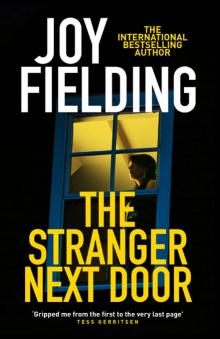 The Stranger Next Door
The Stranger Next Door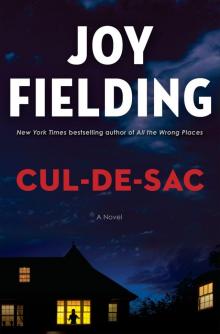 Cul-de-sac
Cul-de-sac The Final Act
The Final Act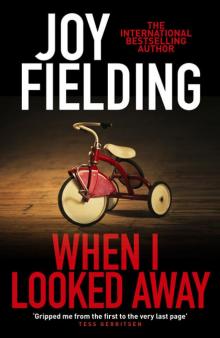 When I Looked Away
When I Looked Away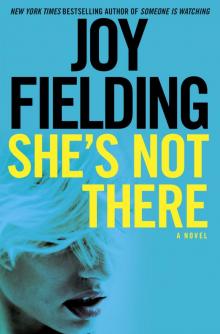 She's Not There
She's Not There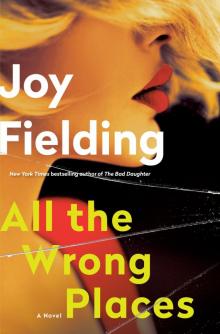 All the Wrong Places
All the Wrong Places Now You See Her
Now You See Her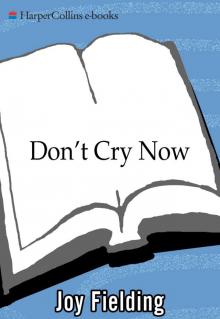 Don't Cry Now
Don't Cry Now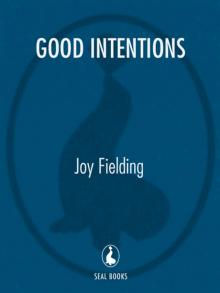 Good Intentions
Good Intentions Still Life
Still Life Lost
Lost The First Time
The First Time Whispers and Lies
Whispers and Lies The Other Woman
The Other Woman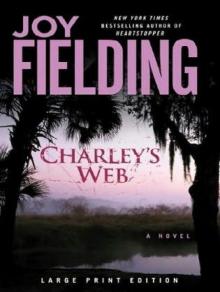 Charley's Web
Charley's Web Mad River Road
Mad River Road Puppet
Puppet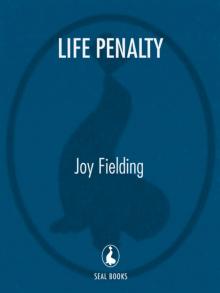 Life Penalty
Life Penalty The Wild Zone
The Wild Zone Home Invasion
Home Invasion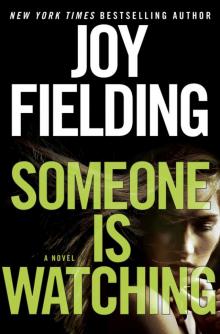 Someone Is Watching
Someone Is Watching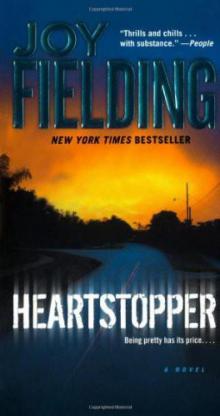 Heartstopper
Heartstopper See Jane Run
See Jane Run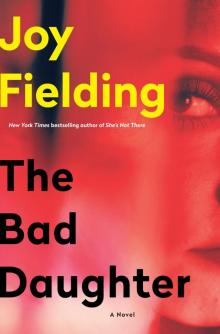 The Bad Daughter
The Bad Daughter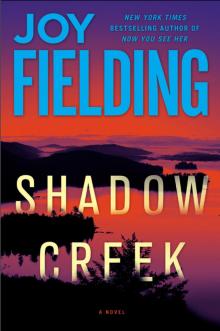 Shadow Creek
Shadow Creek Missing Pieces
Missing Pieces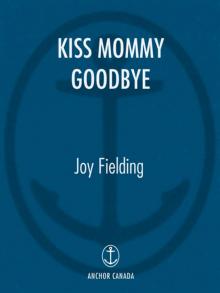 Kiss Mommy Goodbye
Kiss Mommy Goodbye Grand Avenue
Grand Avenue